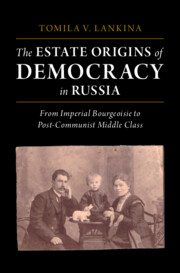Book contents
- Reviews
- The Estate Origins of Democracy in Russia
- The Estate Origins of Democracy in Russia
- Copyright page
- Dedication
- Contents
- Figures
- Tables
- Preface
- Notes on Transliteration
- Abbreviations
- Dramatis Personae
- 1 Theorizing Post-Revolutionary Social Resilience
- 2 From Imperial Estates to Estatist Society
- 3 Mapping Society and the Public Sphere in Imperial Russia
- 4 The Professions in the Making of Estatist Society
- 5 Education, Socialization, and Social Structure
- 6 Market Values and the Economy of Survival
- 7 Family Matters: Looking Back – and Forward – in Time
- 8 Society in Space
- 9 The Two-Pronged Middle Class: Implications for Democracy across Time and in Space
- 10 The Bourgeoisie in Communist States: Comparative Insights
- Afterword
- Supplementary Appendices
- Bibliography
- Index
6 - Market Values and the Economy of Survival
Published online by Cambridge University Press: 02 December 2021
- Reviews
- The Estate Origins of Democracy in Russia
- The Estate Origins of Democracy in Russia
- Copyright page
- Dedication
- Contents
- Figures
- Tables
- Preface
- Notes on Transliteration
- Abbreviations
- Dramatis Personae
- 1 Theorizing Post-Revolutionary Social Resilience
- 2 From Imperial Estates to Estatist Society
- 3 Mapping Society and the Public Sphere in Imperial Russia
- 4 The Professions in the Making of Estatist Society
- 5 Education, Socialization, and Social Structure
- 6 Market Values and the Economy of Survival
- 7 Family Matters: Looking Back – and Forward – in Time
- 8 Society in Space
- 9 The Two-Pronged Middle Class: Implications for Democracy across Time and in Space
- 10 The Bourgeoisie in Communist States: Comparative Insights
- Afterword
- Supplementary Appendices
- Bibliography
- Index
Summary
If we can discern resilience not only in one’s position within estatist society but also in practices intrinsically at odds with Marxist-Leninist dogma, we would have greater confidence in the plausibility of the account of social autonomy presented here. The chapter locates this possibility in the market-reproducing values and networks among the most persecuted strata. I also introduce the hitherto neglected element of diasporic transnational ties that not only aided survival but sustained, nurtured, and engendered specific sets of practices and knowledge. I perform cross-regional statistical analysis of market legacies as linked to the urban estates. Archival, interview, and memoir materials then help tease out the mechanisms of transmission of market-supporting human capital and values. An analysis of transnational–local ties, which the state itself facilitated as it sought to replenish currency reserves, helps dissect their role both in generating “one-off” infusions of wealth for survival and in sustaining links to private banking and enterprise via more temporally protracted flows of remittances. The private wealth and market aspects of the bourgeois legacy are also seen as facilitating what I call hedging, encompassing both private enterprise and public sector professions, which was a career risk-minimizing strategy of the educated estates in evidence long before the Revolution.
Keywords
- Type
- Chapter
- Information
- The Estate Origins of Democracy in RussiaFrom Imperial Bourgeoisie to Post-Communist Middle Class, pp. 200 - 237Publisher: Cambridge University PressPrint publication year: 2021

